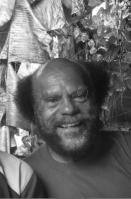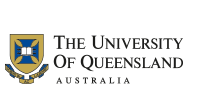John Dademo Waiko

In this interview John Waiko traces his journey from village boy in Tabara in Oro Province to school and then to university in Port Moresby, Canberra and London and reflects on the changes to his identity in the process of becoming an academic and later a politician.
| Time | Summary | Keywords |
|---|---|---|
| 00:00:00 |
Jonathan Ritchie and Ian Kemish welcome Professor John Waiko to the interview. |
|
| 00:00:30 |
John Waiko reflects on the term independence, stating that Papua New Guineans have been independent for thousands of years, growing their own food, hunting and living a self-sustained and self-reliant lifestyle that encompassed a broader view of the nation. |
independence |
| 00:03:15 |
John Waiko discusses his childhood, making fire and listening to the elders discuss the fortunes of the coming day. He recalls his mother telling him that she placed him in a bilum and ran away when the Japanese invaded during the Second World War. He relates the reaction of the people to the invasion, and the role of Anglican missionaries in staying with them. |
Anglican missionaries, Gona, Japanese, martyrs, Philip Strong, World War II |
| 00:07:45 |
John Waiko discusses his education at the Martyrs Memorial School, with Sister Nancy Helen White who established the school and was posted to Manau in 1950. |
education, Martyrs Memorial School, Nancy White |
| 00:10:10 |
John Waiko recalls his education including counting with fingers, pebbles and stones. |
education |
| 00:11:56 |
John Waiko recalls that in Oro Province the Anglican missionaries were English not Australian, including Romney Maurice Gill. |
Philip Strong, Romney Maurice Gill |
| 00:13:34 |
John Waiko discusses that in the 1950s neither his father nor his mother wanted him to go to school, as it was his role to, among other things, look after them in their old age. He recalls his mother's role in feeding the family. |
education |
| 00:16:43 |
John Waiko reflects on whether schooling did change him as his parents' feared. He relates that he learnt from his elders and had history passed down to him, often around the fire. He states that he received advice about moving away from a close village society where it was important to still keep one leg firmly anchored in the village. |
|
| 00:19:07 |
John Waiko discusses the priest, Romney Maurice Gill, who learned Binandere, and later had his ashes scattered in the ocean at Manau. He discusses religious education. |
Binandere, education, Oro Province, Romney Maurice Gill |
| 00:22:51 |
John Waiko discusses his transition from village in Tabara to school on the coast. He recalls his father's warnings. He recalls he was at All Saints School 1956-1960 and then went on to Martyrs School. |
All Saints School, Martyrs Memorial School, Nancy White, Neil Andrew |
| 00:26:57 |
John Waiko discusses the need to have a constant reference to your own identity when moving away from family, tribal area and land. He discusses his selection to go to Madang. |
Madang, Martyrs Memorial School, Prince Charles |
| 00:30:35 |
John Waiko restates the need to have one foot anchored in tradition and culture when the circle of your experience is widening. |
|
| 00:33:50 |
John Waiko relates his impression of Port Moresby in 1967 when he first went to UPNG. He relates an incident that occurred while walking from Boroko when Les Johnson and a group of American VIPs saved him from assault by the Goaribari, the ones who had killed James Chalmers. |
Administrative College, cannibalism, Goaribari, James Chalmers, Les Johnson, University of Papua New Guinea |
| 00:38:53 |
John Waiko recalls visits to PNG by Gough Whitlam and Australian Governor-General Lord De L'isle (William Sidney). He refects on the small number of students during Preliminary Year (PY) at UPNG and the use of technology to record lectures. |
Gough Whitlam, Governor General, University of Papua New Guinea, William Sidney (Lord De L'isle) |
| 00:40:43 |
John Waiko recalls lecturers at UPNG including literature teacher Ulli Beier. He recalls writing his play The Unexpected Hawk at university when he was surrounded by people writing poetry, plays and stories he had grown up with. |
playwright, The Unexpected Hawk, Ulli Beier, University of Papua New Guinea |
| 00:41:53 |
John Waiko discusses the mix of students at UPNG, including Leo Hannett, and learning to write his essays in English during his PY in 1967. |
Leo Hannett, University of Papua New Guinea |
| 00:45:48 |
John Waiko discusses his university days, politics, demonstrating against Australian foreign minister Ceb Barnes and the role of the Vice Chancellor John Gunther. |
Charles Barnes, John Gunther, University of Papua New Guinea |
| 00:50:20 |
John Waiko recalls a time of conversation and dialogue at the university rather than political meetings, and the influence of both teachers and students. He recalls his writing getting him noticed by ASIO when his play was performed in Canberra in 1969. |
ASIO, The Unexpected Hawk, University of Papua New Guinea |
| 00:52:09 |
John Waiko draws a distinction between those Papua New Guineans who had been educated in Australia and who came to UPNG and those who had been schooled locally. |
university graduates, University of Papua New Guinea |
| 00:56:29 |
John Waiko discusses faculty members at UPNG including founding professor of history Ken Inglis and Ulli Beier, and says that their relationship with students was very close in the 1960s. He remembers recording lectures and getting up early in the morning to do his writing. He discusses his 14 months in London writing his Masters thesis. |
Ken Inglis, Ulli Beier, University of Papua New Guinea |
| 01:04:03 |
John Waiko recalls his time in London, and his consciousness at being from PNG and mixing with and learning about Africa. He relates a story regarding his university days. |
Africa, London University, university graduates |
| 01:09:04 |
John Waiko discusses the continuation in his life of collecting oral histories, and his doctorate research at ANU in 1977. |
Australian National University, Canberra, Hank Nelson |
| 01:11:41 |
John Waiko recalls his time returning from London and trying to travel via Cuba to explore the radicalism there prior to independence. He recalls his radicalism and later fights against multinational companies in PNG. |
Cuba |
| 01:15:17 |
John Waiko discusses the original Papua New Guineans travelling from Africa and the theories of Jack Golson. |
Africa, Jack Golson |
| 01:16:10 |
John Waiko mentions the benefits of Australia only colonising PNG for 91 years, minimising the impact on culture and languages. |
Australia |
| 01:18:37 |
John Waiko discusses his attitude to independence on 16 September 1975 and the importance of the event. He describes Australia and PNG walking side-by-side towards independence together in a peaceful manner. |
Australia, independence, Independence Day |
| 01:22:06 |
John Waiko emphasises the importance of village support when entering politics. He briefly mentions his ongoing projects. |
Man Without Pigs, oral history |
| 01:23:19 |
Interview ends. |
Biography

John Dademo Waiko
John Dademo Waiko is an academic and former politician. Born in Tabara in Oro Province in 1944, he attended schools runs by the Anglican missionaries including All Saints School (1956-60) and the Martyrs Memorial School before doing his Preliminary Year (PY) at the University of Papua New Guinea (UPNG) in 1967. He graduated BA (Hons) from UPNG in 1972, followed by an MA in African history from the University of London in 1973. He undertook his doctorate at the Australian National University in Canberra under Hank Nelson and graduated PhD in 1983, only the second Papua New Guinean (according to Hank Nelson) to do so, at that time. His doctoral research took oral history as a starting point through which the Binandare people construct their past, and examined the ways they render the past in the present.
In 1986 he was appointed Professor of History at UNPG a position he held until 1992 when he was elected as a member of parliament (1992-2002). He held several ministries during his political career including Education (1999-2001) and Foreign Affairs (2001-2002). He was the author of the play The Unexpected Hawk (1969) performed to audiences in Canberra and Europe, and he has also authored a number of histories including A Short History of Papua New Guinea, OUP 1993 (2007) and Papua New Guinea: A History of Our Times, OUP 2003. He was the subject and narrator of the film Man Without Pigs (1990) directed by Chris Owen and Minister without Money (2006) directed by Bao Waiko. He continues to undertake oral history projects and film making.
Copyright © Papua New Guinea National Museum & Art Gallery, 2018
The copyright holder of this material grants users permission to access the material on this website for the following purposes only: research and study, education, other non-commercial and non-public uses.




